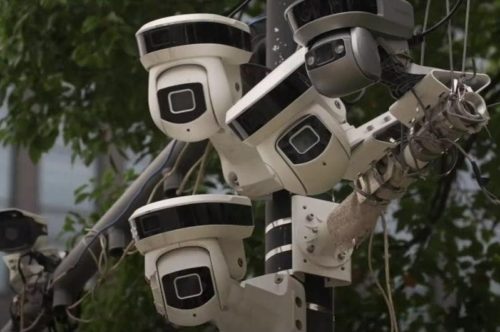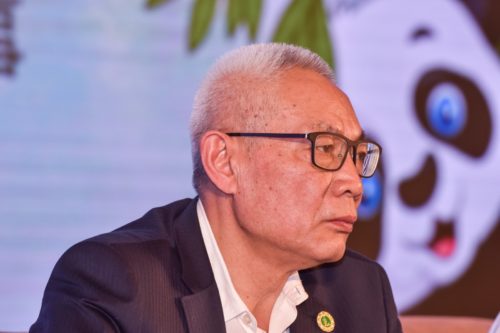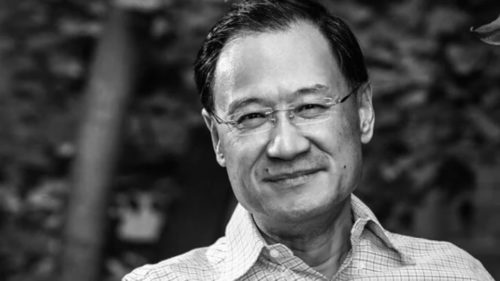A second Tsinghua University professor is investigated — but this time, for not teaching Marxism ‘correctly’
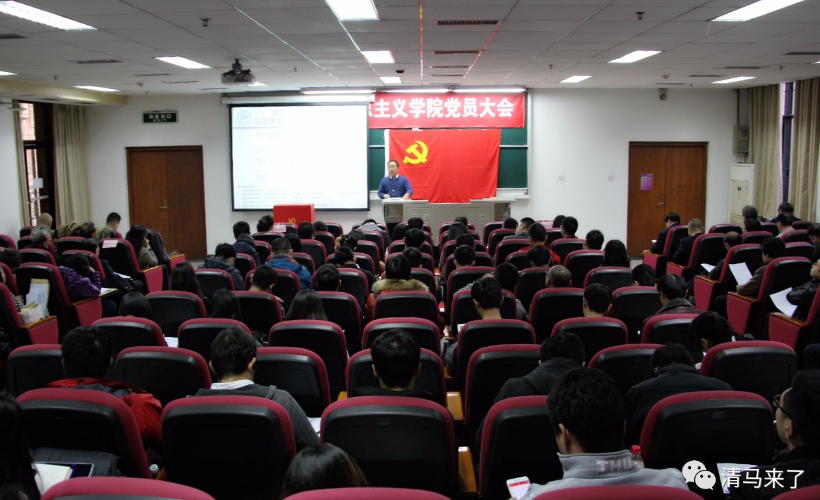
A picture of a Tsinghua University Marxism department meeting from 2017.
The suspension and investigation of Tsinghua University Professor of Law and liberal intellectual, Xǔ Zhāngrùn 许章润, was sudden but not unexpected. His controversial essay, titled “Imminent Fears, Immediate Hopes,” that attacked Xi Jinping’s scrapping of presidential term limits went viral over half a year ago — but 2019 is not a year like any other. This year is chock full of sensitive anniversaries for the Chinese Communist Party, and the two of utmost importance, the 100th anniversary of the May Fourth Movement and the 30th anniversary of the Tiananmen Square Protests, are just around the corner.
Indeed, as The China Project previously reported, there are already signs that the Youth League committees of institutions that played a crucial role in these landmark events, such as Peking University, have begun scoping out the political inclinations of their classmates in order to ensure nothing out of the ordinary happens in the near future.
However, an investigation of another Tsinghua University professor, parallel to the one being conducted on Xu but virtually unnoticed by media outlets, once again shows that political censorship in 2019 is not a simple case of Communist Party top brass ordering university minions to check their faculty. Rather, patriotic leftist students also play a crucial role in transforming spaces where liberal ideas could find a safe haven into political straightjackets, or even traps.
On the same day the New York Times published its piece on Xu’s suspension, a virtually unknown WeChat public account called Hi社会 (“Hi Society”), run by what seems to be a couple nicknamed “Mao Mao” (毛毛) and “Dun Dun” (顿顿) and thus joint WeChat handle “MaoDun” (a play on the homonymic word for contradiction, 矛盾 máodùn) published an article about the formal complaints they had made against Tsinghua University’s Lǚ Jiā 吕嘉, an associate professor at the School of Marxism.
The essay opens with a celebratory tone as the writers announce that the university’s Youth League committee had swiftly responded to their complaint and, more importantly, decided that it would open an investigation on Professor Lü.
The moralizing and heavily theoretical essays written by Hi Society — which proclaims to “erect the basic principles of Marxism and take young people along to help them understand our society together” — usually don’t gain much traction, with a couple of thousand views maximum on previous posts. However, their essay calling out Lü, titled “Polluted Weather Might Clear Up” (雾霾天气可能缓解), received 72,000 views in four days before it was taken down late on Thursday. Screenshots of the essay are embedded below, with analysis.
To be sure, besides the coincidence in timing, this case has little in common with the silencing of Xu. Unlike the outspoken intellectual, Lü is on the opposite (and “politically correct”) side of the academic spectrum, a transmitter of Communist Party propaganda in the obligatory Marxism ideology classes that mainland Chinese students at all levels are forced to take to some degree. But this only makes the reasons used by “MaoDun” to justify ratting out their teacher even more revealing of the pernicious effects of political indoctrination, in itself part and parcel of the CCP’s tightening ideological grip over university campuses that doomed Xu.
The essay opens with a celebratory tone as the writers announce that the university’s Youth League committee had swiftly responded to their complaint (this was their third time filing a complaint) and, more importantly, decided that it would open an investigation on Professor Lü. According to the writers, Lü’s political ideology classes are the work of “monsters and demons” (牛鬼蛇神 niúguǐshéshén), a special term for intellectuals that had been labeled traitors, secret agents, or counter-revolutionaries in the Cultural Revolution (1966-1976). The references to Maoism continue as the authors declare, “life can be varied but this the Party’s leadership cannot be lost, guiding ideology cannot be stopped. Hundred flowers [blooming] must be abandoned, poisonous weeds are unacceptable.”
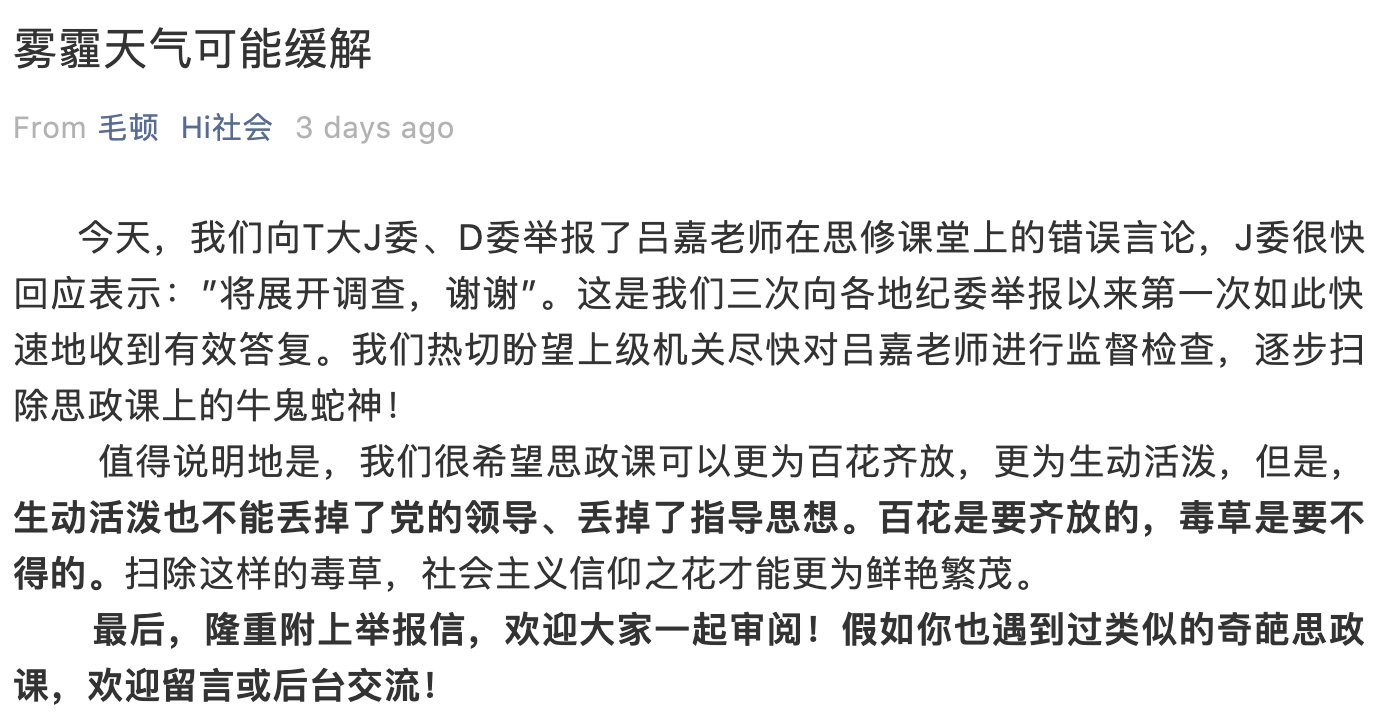
The rest of the essay is composed of images showing excerpts of powerpoint slides from Lü’s lectures and the corresponding sin “MaoDun” believes each of these to embody. These turned out to be incredibly banal, as it is clear both students are simply being nitpicky, pointing out that Lü’s discussions of personal identity, religion, and other topics are in contradiction with Marxism’s focus on the primacy of material conditions and science.

“MaoDun” uses Xi Jinping’s March 18 speech on ideological education in schools to legitimize their attack on the Marxist professor (second paragraph of above screenshot).

The couple take issue with the statistics on the Cultural Revolution used by the professor (underlined above), only natural given their Maoist sympathies.

This accusation centers around Lü’s definition of Socialism with Chinese Characteristics as “Scientificism.” What this means exactly is unclear but the students clearly didn’t like the fact that their professor framed Xi’s theoretical crown jewel as a mere continuation (underlined above) of previous concepts. Perhaps the biggest irony of all is that they argue such wording is tantamount to a violation of the constitutional law. They clearly have not read Xu’s essays on what Xi has been doing to the constitution…

Like any good Maoist, “MaoDun” take offense at any mention of Western civilization that isn’t disparaging or demonizing. Lü makes the bland point that Western Christian civilization is still the global mainstream and then points out that China’s civilization has been in constant decline because it “passes on knowledge rather than culture”. The young accusers saw that as implying the professor believed Chinese civilization to be worse than its Western counterpart.

This was arguably the viewpoint that most infuriated the young Maoists, so much they underlined it in squiggly red. In this slide, Lü writes, “Theory: in a communist system the people become the owners of society,” followed by, “Reality: socialized production will always be controlled by a few.” Perhaps slightly politically incorrect given Chinese state’s adherence on paper to Marxist-Leninism but calling it a “violation of the constitution,” as the pair do in their final sentence, is overdramatic to say the least.

In the style of speeches given during struggle sessions (批判大会 pīpàn dàhuì) held frequently throughout the Cultural Revolution to publicly humiliate “reactionaries” of all kinds, the article ends by summarizing all of Lü’s crimes, sprinkling some more hyperbole (e.g. stating that Lü’s “anti-Party” teachings have been propagated to a total of 9271 students since he began teaching in 2001), and referring once more to Tsinghua University’s duty to follow Zhongnanhai’s orders and work toward improving its students ideological education.
In the words of one long-time liberal PKU professor, “researchers at the School of Marxism have only Xi Jinping’s speeches to work with, poor them.” Lü went off script, and that was enough to get him into deep trouble.
This case of two Chinese students denouncing a Marxist professor in the style of the Cultural Revolution is revealing in many ways. For one, it shows that the elevation of ideology during the Xi Jinping era is not only bad news for liberal intellectuals, it also raises the stakes for those in charge of spreading correct thinking on university campuses. Tsinghua is still full of politics, law, and sociology professors in the liberal camp but the fact that Lü was so publicly attacked for saying a few banalities, and is now under investigation for it, highlights the real purpose of the School of Marxism in Chinese universities: to police honest academic discussion, not participate in it.
In the words of one long-time liberal PKU professor (who shall remain nameless for obvious reasons), “researchers at the School of Marxism have only Xi Jinping’s speeches to work with, poor them.” Lü went off script, and that was enough to get him into deep trouble. Similarly, Party-loyal intellectuals who have mastered avoiding buzzwords and leaving room for misinterpretation can often get away with giving opinions much more controversial than the ones Lü might lose his job for. Timothy Cheek, Joshua A. Fogel, and David Ownby’s translation of retired Central Party professor Cài Xiá 蔡霞 is a case in point — you can even defend constitutional democracy, as long as you couch it in the correct terms.
Yet the two barking writers would unexpectedly find themselves on the hot seat in the post’s comments section as fellow students proceeded to criticize the attack, to the point they took down their essay around midnight yesterday, Beijing time. Fortunately, The China Project took some screenshots of the most biting comments before they disappeared into the ether:

“Is your objective to educate students to become snitches?”

“The author doesn’t understand Marxism, doesn’t understand a scientific research method, but has simply studied the Cultural Revolution young militants’ practice of magnifying a problem into a question of ideological line and sticking it on a big-character poster. Boring, Shameless.”

“There is no denying that this teacher’s lectures do contain some personal views wedged in between the cracks but I think the role of religion, self-consciousness, etc. these are all questions that should be discussed. If you aren’t happy with the contents of political ideology class, or if you have a completely different viewpoint, you are more than welcome to discuss this with the teacher during or after class, but borrowing the power of those at the top to simply ‘resolve’ this different view is really insidious: if everyone were like that, well then humanities teachers would all be dragged out ‘for a walk,’ and the ethos of academic discussion would no longer be free.”
[Author response] “[…] This academic freedom you speak of is the freedom to, during a Marxism-Leninism class, distort Marxist-Leninism? […]”
Although Tsinghua’s detailed justification for Xu’s suspension is yet to be seen, this disturbingly bizarre parallel case highlights a danger that academics in elite universities are not exempt from: being reported by their students. Was it a lengthy and detailed formal complaint such as this one that finally gave Xu’s enemies inside and outside Tsinghua reason to take him down? We might never know, but what cannot be denied is that there is an increasingly larger (and louder) faction of politicized youth in Tsinghua and neighboring Peking University determined to enforce ideological conformity and political correctness on students and teachers alike.
As one former member of the Peking University Marxist Society, which has since January been replaced by a Youth League-backed reading group, once confided after a scuffle with the university’s Youth League goons:
“We just wanted to have a meeting but [the Youth League members] would bang on the door, stand on chairs to look inside, eventually barging their way in, screaming at us as if we were heretics. I can’t believe they would treat fellow classmates like this.”
Echoes of the CCP’s fraught experiments with ideology seem to be making a comeback in this year of anniversaries…


